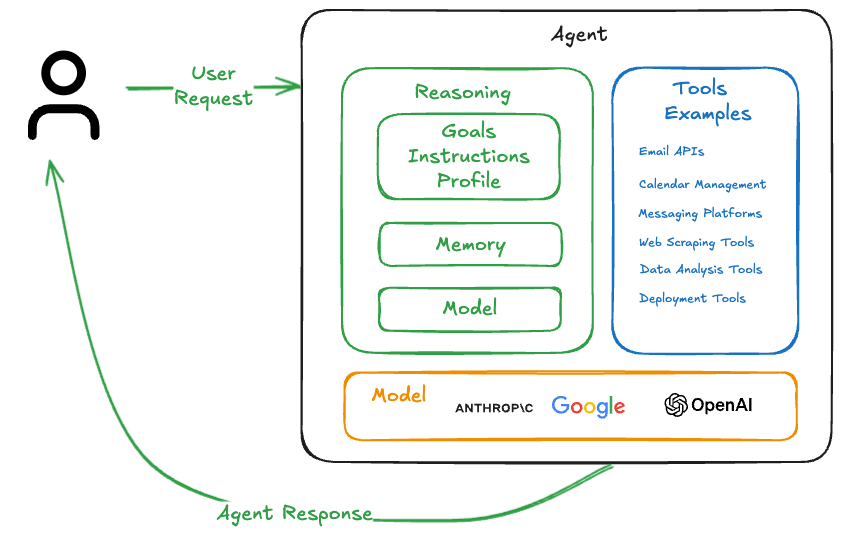What are AI Agents?
Exploring what AI Agents are.
AI agents are software programs that can interact with their environment, collect data, and independently perform tasks to achieve predetermined goals. According to AWS's definition, while humans set the goals, AI agents autonomously choose the best actions needed to accomplish these objectives[1]. These systems represent a significant evolution in artificial intelligence, moving beyond simple automation to more sophisticated, autonomous decision-making capabilities.

Core Capabilities
Modern AI agents possess several key capabilities that distinguish them from traditional software:
Perception and Processing
AI agents can convert raw inputs into actionable information. This includes processing various types of data, from text and images to complex sensory information. The perception module allows agents to understand and interpret their environment effectively.
Autonomous Decision Making
Unlike traditional programs that follow rigid rules, AI agents can make independent decisions based on their analysis of situations. According to TechCrunch's analysis, they can perform tasks that previously required human intervention, from customer service to complex problem-solving[2].
Learning and Adaptation
Modern AI agents can learn from experience and adapt their behavior accordingly. This capability allows them to improve their performance over time and handle new situations more effectively.
Types of AI Agents
Simple Reflex Agents
These agents act based on current perceptions, following predefined rules. They're useful for straightforward tasks where the response is immediate and doesn't require context or memory.
Model-Based Agents
These more sophisticated agents maintain an internal model of their environment, allowing them to make decisions based on both current and historical information.
Goal-Based Agents
These agents work toward specific objectives, choosing actions that will help them achieve their goals. They're particularly useful in complex business environments where multiple paths to success exist.
Learning Agents
The most advanced type, these agents can improve their performance through experience. They modify their behavior based on outcomes and adapt to changing circumstances.
Business Applications
Customer Service
AI agents have transformed customer support by:
- Handling routine inquiries 24/7
- Escalating complex issues to human agents
- Learning from customer interactions
- Providing consistent service quality
Process Automation
In business operations, AI agents excel at:
- Workflow optimization
- Document processing
- Data analysis and reporting
- Resource allocation
Decision Support
AI agents assist in decision-making by:
- Analyzing large datasets
- Identifying patterns and trends
- Providing recommendations
- Forecasting outcomes
Implementation Considerations
Technical Requirements
According to the Digital Ocean's analysis[3], successful AI agent implementation requires:
- Robust data infrastructure
- Processing capabilities
- Integration frameworks
- Security measures
Organizational Readiness
Organizations must prepare for AI agent deployment by:
- Training staff
- Establishing governance frameworks
- Creating clear processes
- Monitoring performance
Future Developments
The field of AI agents continues to evolve rapidly. Reuters reports that autonomous agents and profitability will dominate the AI agenda in 2025[4]. Key trends include:
Enhanced Autonomy
Agents are becoming increasingly capable of handling complex tasks with minimal human oversight.
Improved Collaboration
Multi-agent systems are emerging, where multiple AI agents work together to solve complex problems.
Greater Understanding
Advances in natural language processing and context understanding are making agents more effective at human interaction.
Sources
- Definition and core capabilities of AI agents
- Real-world applications and impact
[3] Digital Ocean AI Implementation Guide
- Technical requirements and implementation considerations
- Future trends and developments
Note: As AI agent technology continues to evolve, organizations should regularly assess new capabilities and opportunities while ensuring responsible implementation and use.